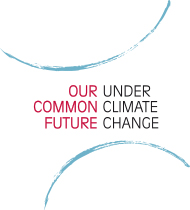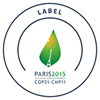Our Common Future Under Climate Change
International Scientific Conference 7-10 JULY 2015 Paris, France
- Home
- Side Events
- 105 Current and Future Research trends on Climate Change and Health
CURRENT AND FUTURE RESEARCH TRENDS ON CLIMATE CHANGE AND HEALTH
Overview
Organizers : INSERM (Institut national de la sant� et de la recherche m�dicale)
Date : July 6th, from 2pm to 6pm
Location : Aviesan, Biopark Auditorium, 75013 Paris
Expected number of participants : 50-100
Nature of participants : scientists, journalists, NGOs
Keywords : socio-economic status, big data, human pathologies, monitoring and modeling
Summary
The human health consequences of global environmental changes are among the top priorities of citizens worldwide. There is strong evidence that climate change has already had significant effects on population health and additional negative consequences are expected in coming decades. One of the critical issues is how climate change, together with other associated environmental and social stressors, leads to specific health consequences. Understanding such effects and possible interactions will be critical for effective public health planning.
The mini-symposium will present state of the art knowledge on the health effects of climate change and its possible interactions with other stressors as well as future research trends. It is motivated in part by the exposome concept which aims to integrate in a comprehensive manner environmental exposures and their impacts on health. Addressing climate change health effects in this context has several important implications: health effects at various levels from early biological modifications to clinical symptoms are studied taking into consideration climate change as well as other stressors such as atmospheric pollution, biological pathogens and socio-economic factors. In addition, observational, epidemiological and experimental studies are carried and integrated using multidisciplinary approaches. Finally, it is critical to gather large amounts of environmental, behavioral and health data, as well as models of future trends, and to develop the methods to analyze and to integrate those data.
The mini-symposium will include two sessions and a round table. The first sessions consists of presentations on critical health outcomes of climate change and related environmental stressors. Talks will address: i) air pollution, including how climate change, meteorological factors and atmospheric pollutants contribute to particulate and gaseous air pollution and consequent impact on health; ii) the emergence and spread of infectious diseases due to climate change in interaction with other environmental and social drivers; iii) the contribution of socio-economic, age or gender vulnerabilities to the exacerbation of climate change effects. The second session will focus on innovative methods that will shape the research of the future. These include the gathering and mathematical analysis of big data obtained from surveying the environment and human health, modeling the interactions between ecological changes and human health, in addition to monitoring exposures as well as physical and behavioral parameters using new sensors and devices. Such methods will have significant impacts on future environmental, biomedical, public health and socio-economic research. The round table will focus on future trends in research, research needs and translation of science findings into public health decisions.
�Preliminary program:
- Opening: Pr Yves L�vy, Aviesan
- Short introduction on applying the exposome concept in the context of climate and health
- Session 1: critical health effects.
- Session 2: New methodologies.
- Round table: chaired by P Kinney
The mini-symposium will present state of the art knowledge on the health effects of climate change and its possible interactions with other stressors as well as future research trends. It is motivated in part by the exposome concept which aims to integrate in a comprehensive manner environmental exposures and their impacts on health. Addressing climate change health effects in this context has several important implications: health effects at various levels from early biological modifications to clinical symptoms are studied taking into consideration climate change as well as other stressors such as atmospheric pollution, biological pathogens and socio-economic factors. In addition, observational, epidemiological and experimental studies are carried and integrated using multidisciplinary approaches. Finally, it is critical to gather large amounts of environmental, behavioral and health data, as well as models of future trends, and to develop the methods to analyze and to integrate those data.
The mini-symposium will include two sessions and a round table. The first sessions consists of presentations on critical health outcomes of climate change and related environmental stressors. Talks will address: i) air pollution, including how climate change, meteorological factors and atmospheric pollutants contribute to particulate and gaseous air pollution and consequent impact on health; ii) the emergence and spread of infectious diseases due to climate change in interaction with other environmental and social drivers; iii) the contribution of socio-economic, age or gender vulnerabilities to the exacerbation of climate change effects. The second session will focus on innovative methods that will shape the research of the future. These include the gathering and mathematical analysis of big data obtained from surveying the environment and human health, modeling the interactions between ecological changes and human health, in addition to monitoring exposures as well as physical and behavioral parameters using new sensors and devices. Such methods will have significant impacts on future environmental, biomedical, public health and socio-economic research. The round table will focus on future trends in research, research needs and translation of science findings into public health decisions.
�Preliminary program:
- Opening: Pr Yves L�vy, Aviesan
- Short introduction on applying the exposome concept in the context of climate and health
- Session 1: critical health effects.
- Session 2: New methodologies.
- Round table: chaired by P Kinney
Key outcomes
The human health consequences of global environmental changes (GEC) are among the top priorities of citizens worldwide. There is strong evidence that climate change (CC) which is one of the many GEC (land-use changes, ocean acidification, biodiversity loss, transcontinental trade and transportation,�), has already had significant effects on population health and additional consequences are expected in coming decades.
One of the critical issues is how and to what extent CC, together with other associated environmental and social stressors, leads to health consequences at the individual and population levels. Understanding such effects and possible interactions between different stressors will be critical for effective public health decisions.
The mini-symposium hosted by the French Alliance for research in life sciences and health (Aviesan) in collaboration with the research alliances AllEnvi (the French national alliance for research on the environment) and Athena (the French national alliance for research on human and social sciences), aimed at exploring the current research trends and the new multidisciplinary approaches that will support future research.
The present article will discuss some of the major conclusions and perspectives of the symposium and is by no means a comprehensive summary of the talks and discussions.



